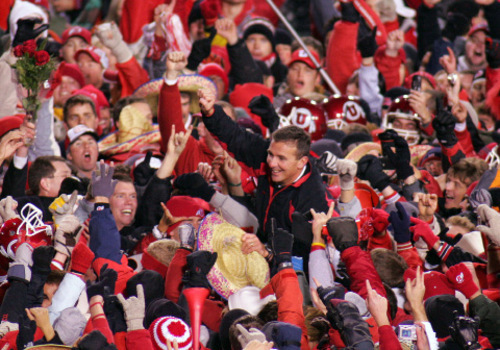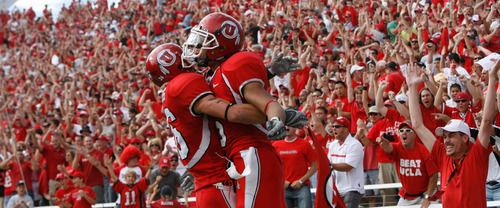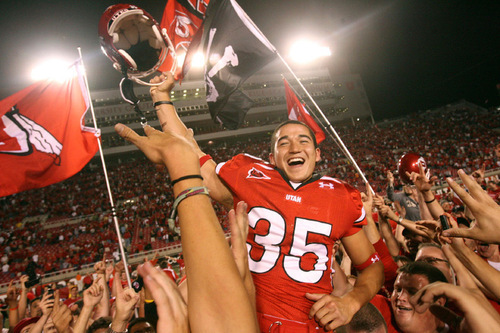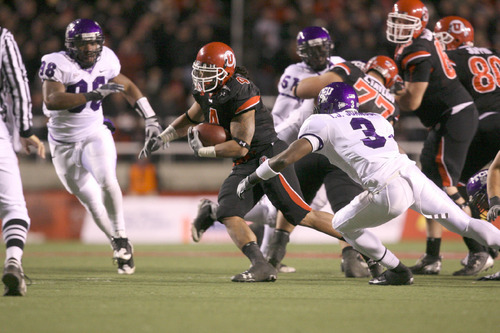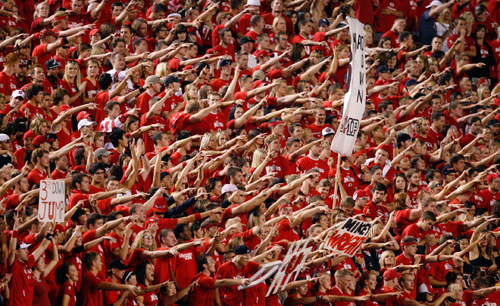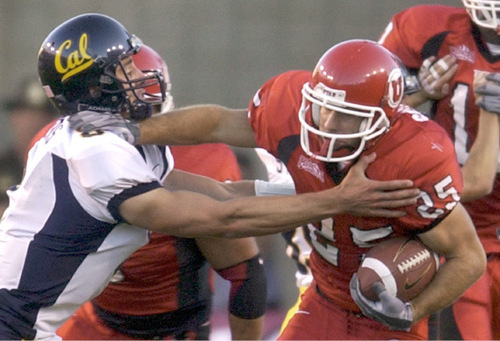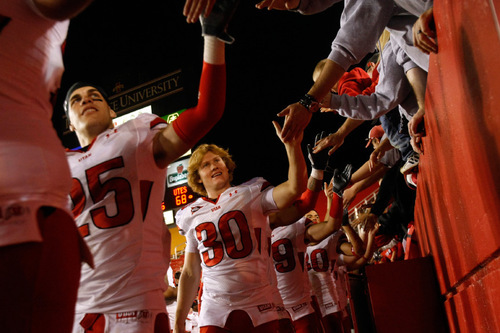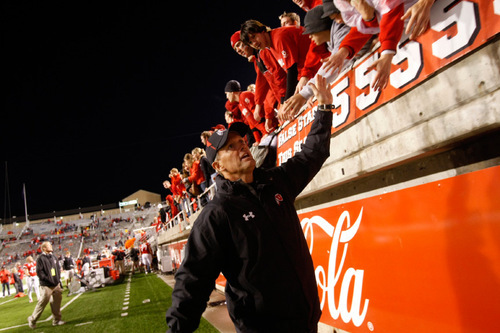This is an archived article that was published on sltrib.com in 2010, and information in the article may be outdated. It is provided only for personal research purposes and may not be reprinted.
Only a short time ago, the Utah Utes struggled to fill Rice-Eccles Stadium. There were ticket giveaways, special packages and other tantalizing promos to entice fans to attend games.
Even fans holding tickets could be fickle. If a mediocre opponent or bad weather was in town, many were no-shows.
Not anymore.
Rice-Eccles Stadium has become the place to be in Salt Lake City on game day. The Utes are averaging 45,240 fans this year, which exceeds the seating capacity of 45,017.
The student section has its own identity with the MUSS (Mighty Utah Student Section), a 6,000-plus member group who harasses and hounds opposing teams so much that TCU coach Gary Patterson took his team inside this week, hoping to replicate the noise and commotion Utah's students cause.
But even he acknowledges there is little he can do to mimic the craziness and intense atmosphere that will greet his third-ranked Horned Frogs Saturday when they take on the fifth-ranked Utes at 1:30 p.m.
It's as if the blackout, the involvement of Under Armour's 'Wounded Warrior' uniform project and the presence of College GameDay are all coming together to create the worst kind of atmosphere an opponent could imagine at Rice-Eccles Stadium.
"We know it's going to be a hostile crowd looking for us," Patterson said. "We understand there are some TCU fans coming, but there won't be a lot of people cheering for us."
The Utes have won 21 straight home games, a streak that started with an upset over No. 11 UCLA in 2007 and ranks behind Oklahoma (35) and Boise State (29) for the current longest home winning streaks in the nation.
The school record for consecutive wins is 26, set from 1928-34.
While the Utes have improved as a team in recent seasons, Utah coach Kyle Whittingham and his players often credit the fans for helping them win.
"We've had a good run at home and it's a real credit to our fans and the atmosphere at our place," he said. "The players really get juiced up at home and there is certainly an advantage for us. The 2008 win [over TCU] had a great atmosphere and the crowd had a lot to do with that."
The interest in Utah football has grown steadily since Urban Meyer breathed life into the program. The momentum has continued along with the Utes' success.
While there are constant rumors that Utah might expand the stadium once in the Pac-10, Utah athletic director Chris Hill has said he is in no rush to put expansion plans in action. Perhaps he remembers the days when one loss would send fans jumping off the Utes' bandwagon before it even stopped rolling.
However, it will be hard to ignore Utah's attendance if it maintains the high level once the team joins the Pac-10, even with losses.
That is, if it suffers some home losses.
The Utes say Rice-Eccles has such a magic mojo for them now they often feel unbeatable playing at home.
"It's real loud, the defense feeds off it for sure," corner Lamar Chapman said. "If something happens and they've got the ball on their 10-yard line down there and the crowd gets going, we definitely feel we get the stops down there."
The crowd seemed to impact TCU in 2008. TCU kicker Ross Evans missed field goal attempts from 26 and 36 yards in the final six minutes and a stalwart TCU defense suddenly broke apart underneath the pressure from Johnson and the Utah offense.
The Utes hope their crowd can have a similar influence Saturday, with a similar outcome.
"It's like our fans take everything personally and make the atmosphere," safety Justin Taplin-Ross said. "When something is on the line at our house, we know we have a record to uphold. We want to keep that going." —
Hot ticket
Utah's home football attendance has been on an upward arc since 2003. This season's Rice-Eccles games have all been virtually sold out.
Year Season Tickets Avg. Attendance
2003 16,147 41,478
2004 19,555 44,112
2005 21,540 41,536
2006 24,250 43,279
2007 25,141 42,593
2008 29,553 45,542
2009 31,000 45,155
2010 31,000 45,240*
*Through four home games


